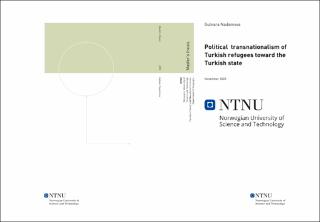| dc.description.abstract | This thesis focuses on various factors affecting the political transnational participation of Turkish refugees who have migrated since 2016 to the Western countries. The level of political transnationalism of Turkish refugees is analyzed at different levels. At the micro-level, the agency characteristics and motivations of the Turkish refugees have been analyzed. Furthermore, the establishment of social movement organizations and their transnational networks have been explained at the institutional level. Finally, the receptive and home countries’ policies, which might provide or constrain the political transnational mobilization of Turkish refugees are analyzed at the country level. The respective host countries, Germany, Norway, and the United States have been selected with the aim to compare the political transnational participation of Turkish refugees in these countries.
The empirical part of the thesis builds on semi-structured interviews with the Turkish refugees and the analysis of web pages of various social movement organizations. The related news and state reports are included in the analysis. The interviews are analyzed qualitatively, and web pages are scrutinized through content analysis. The respondents of the study have shared their experiences, motivations, opinions regarding their political transnational participation.
I argue that the transnational network exchange theory and conceptual framework of transnationalism are direct and appropriate theoretical and conceptual frameworks for analysis of transnational political activities of refugees in my study. These theoretical frames help me with the explanation of what, why, and how political refugees participate in political transnational participation toward their country. It has been argued that the political transnationalism of the refugees in the study is influenced by their capacities, motivations, and various opportunities and restrictions in the host countries. Furthermore, extra-territorial authoritarian practices of the Turkish state deter refugees and affect the level of their political transnational participation.
My findings also indicate that there is a small portion of Turkish refugees who participate actively in political transnational participation. Indeed, there is a small portion of those who participate in political transnational participation in form of high-risk activism. Turkish political refugees participate in institutional social movement organizations as the anti-regime advocates. The official members of social movement organizations participate in high-risk and high-level political transnational participation while most of the Turkish refugees participate in political remittances and low-risk and guarded advocacy through digital participation. First and foremost, there is a small portion of Turkish refugees who participate actively in political transnational participation.
My findings also show that refugees’ political transnationalism has been experienced in different contexts of reception in Germany, Norway, and the United States. It is maintained that refugees in these respective countries experience different obstacles. The respondents in Germany and Norway indicated that they have language obstacles when they are participating in transnational activities while in the United States the refugees identified their overloaded job hours as the major obstacle to participation in transnational political activities. A settlement program is indicated as also one of the crucial factors in transnational participation of the Turkish refugees who convey that, on the one hand, resettlement to remote places makes it financially complicated to commute between places that are offering transnational activities. On the other hand, living in big cities might similarly diminish their participation. In cities, there are larger numbers of Turkish diaspora groups, resulting in exposure to possible surveillance and intimidation by the groups supportive of the Turkish state. | |
